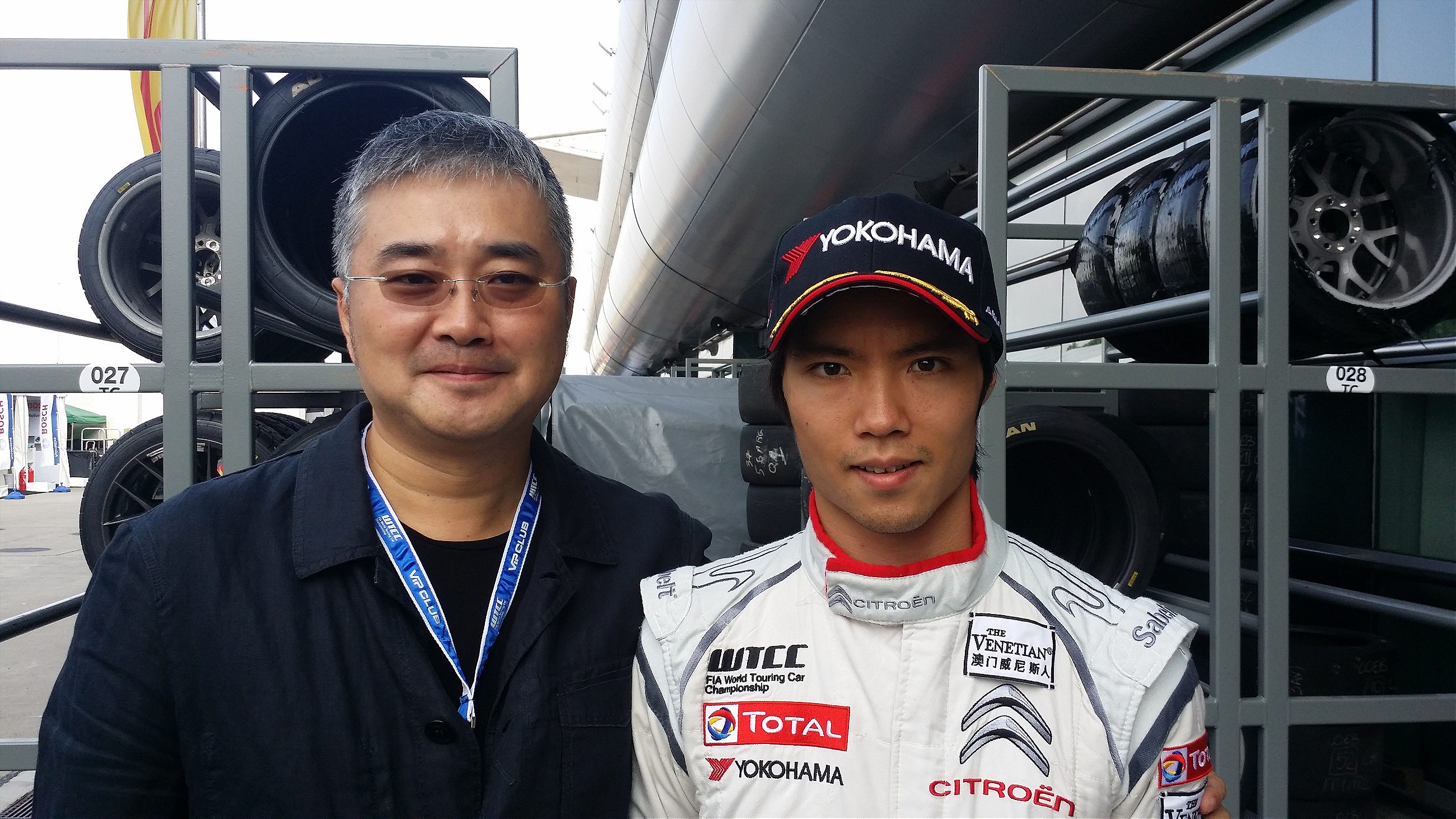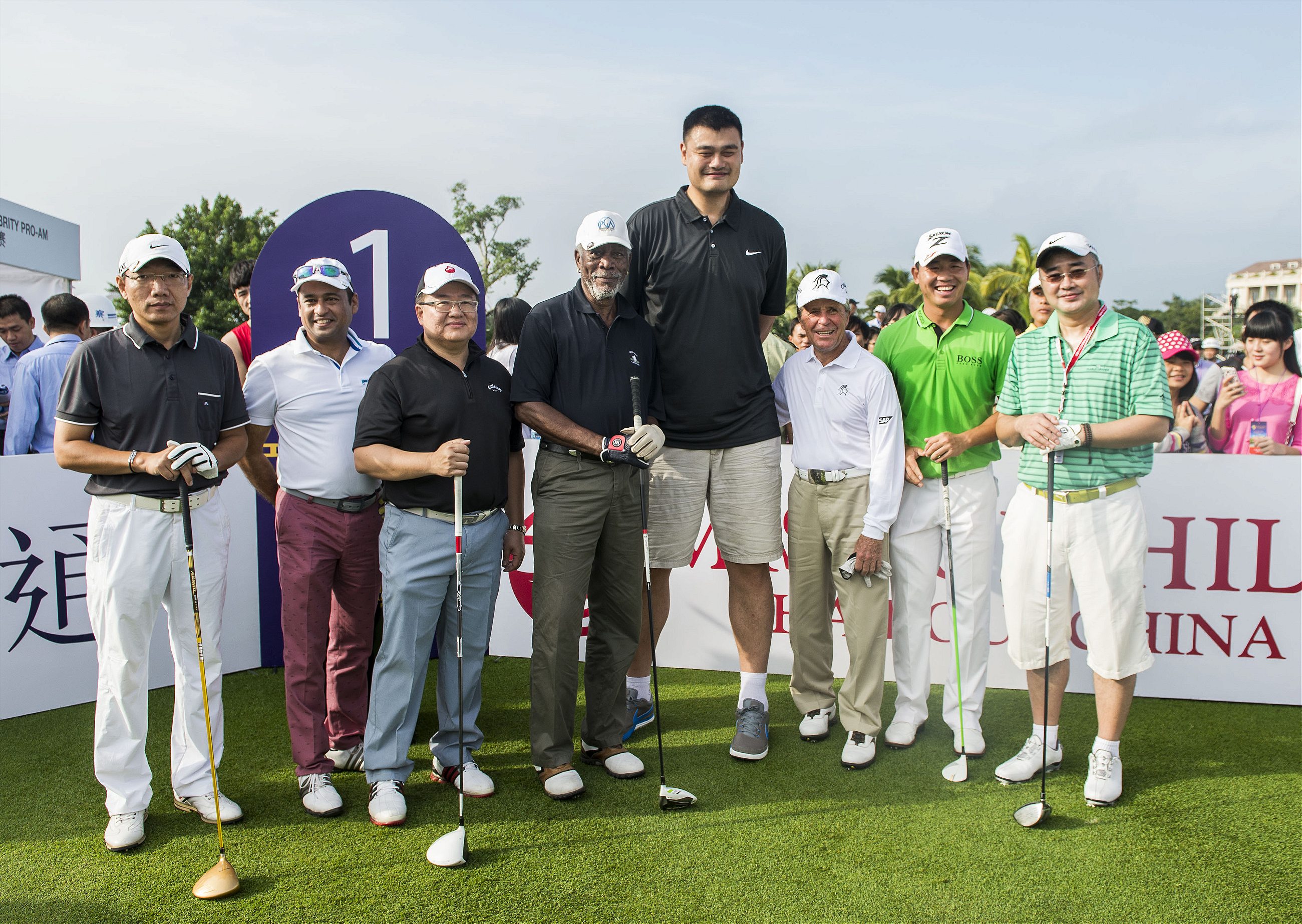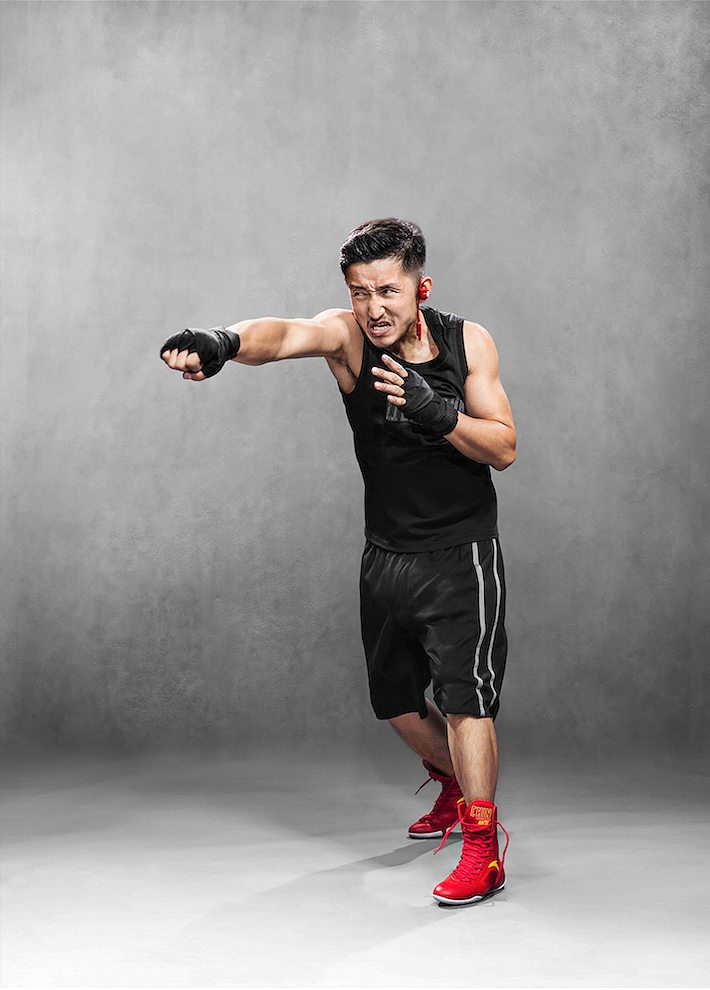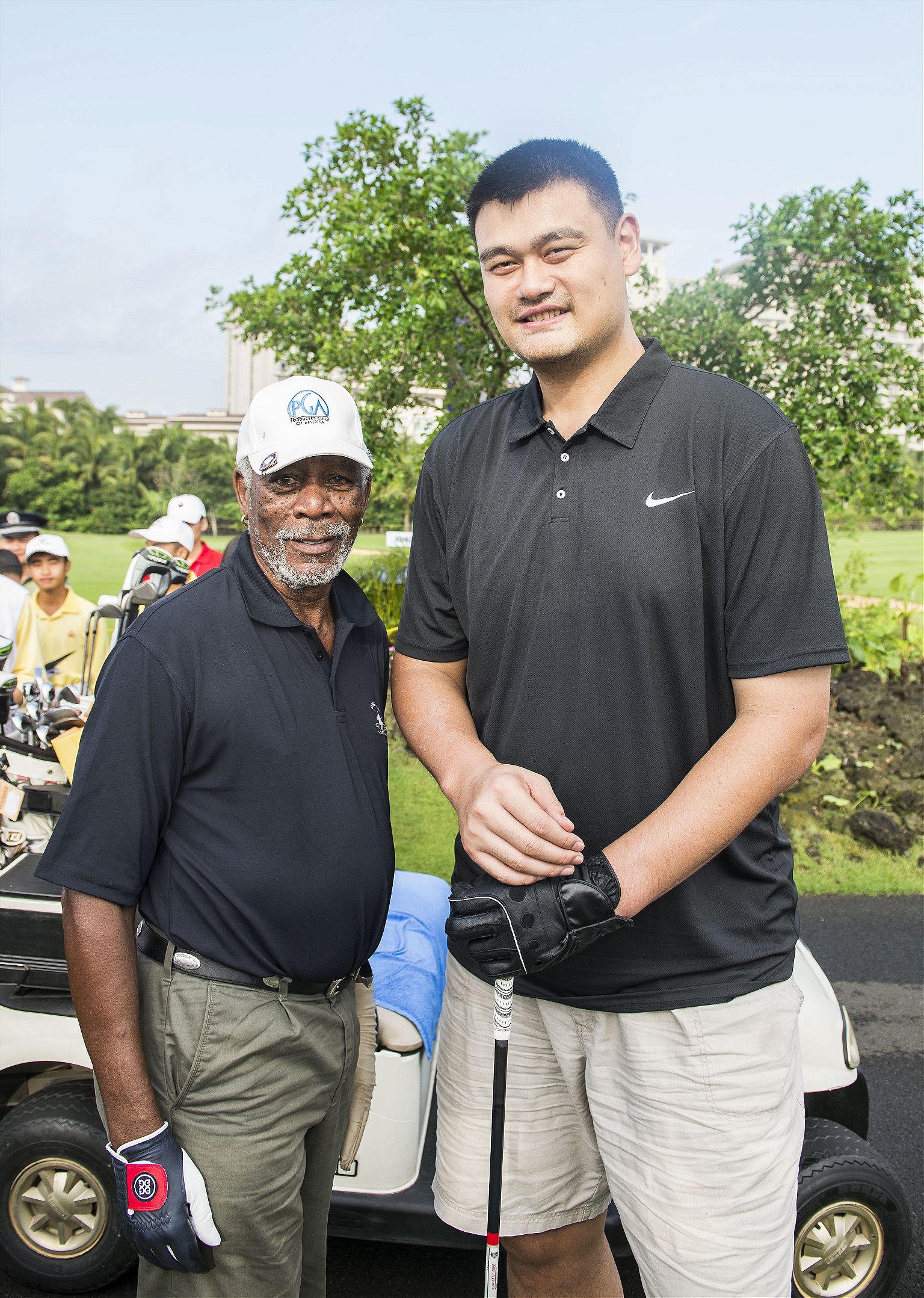Superagent Sheng Li wants to bring Hollywood-style talent management to Chinese sports.
MACAU—
It’s easy to get lost in Yao Ming’s shadow. The former NBA All-Star is 7 feet 6 inches tall and now, in his third year of retirement, is at least a touch over his 310-pound playing weight.
But it isn’t just the ex–Houston Rocket’s physical size that swallows up those surrounding him. There’s a constant swirl of activity that follows Yao wherever he goes, as onlookers jockey for position, cameras at the ready. The madness of such moments is not lost on his longtime friend and business partner Sheng Li. In fact it’s all part of the game for a man on a mission to help Chinese sports go global.
As CEO of Sports Entertainment Content Activation, a sports management and events company, the 44-year-old Sheng is rapidly gathering a stable of his nation’s biggest sporting stars while also branching out into major sports-based promotions. Yao not only relies on SECA’s advice in his business affairs—he’s also a minority partner and a longtime friend of Sheng’s.

In October, Sheng attended the Mission Hills World Celebrity Pro-Am golf event on the southern Chinese island of Hainan, where Yao was a constant focal point. Oscar winners Nicole Kidman and Morgan Freeman, along with A-listers Jessica Alba and Chris Evans, were all in attendance over the weekend, sandwiched by Yao fans that numbered in the tens of thousands, all milling around the golf course and its surroundings.
That a Chinese athlete could command such attention would have been unheard of in the pre-Yao era, but increasingly the country’s sports stars are breaking free from the constraints once imposed by a restrictive state-controlled sporting system that frowned on individual superstars.
I sat down with Sheng a few weeks later in Macau. We met on the sidelines of the Clash in Cotai II boxing event that featured flyweight world title hopeful Zou Shiming, another Sheng client. Zou, like Yao before him, is fast learning how to be the center of attention as he shares the fight card’s top billing alongside future Hall of Famer Manny Pacquiao, the fighter and congressman from the Philippines who has won a record eight world titles across eight weight divisions.
Sheng laughs as he recalled a young Yao traveling to Houston for the first time, not fully equipped for NBA’s star-focused ethos. The Rockets were a team, but they were a team being built around their towering center, and it took time for Yao—raised on conservative Chinese traditions—to realize that in sport sometimes it’s OK to be No. 1, to put yourself first, to dominate. It’s a lesson Sheng is hoping a generation of Chinese athletes will be quick to learn as they look to cash in on professional sports’ rising prominence in the world’s largest economy.

“We need bad boys,” Sheng says. “In sports sometimes you need bad boys. What previously was lacking a bit with Chinese athletes was the killer instinct. Yao was certainly lacking it a little bit. Our culture rewards the people who obey. But in sports, it’s actually about the ones who can risk it all, who—pardon my language—say ‘Just fuck it. I am going to go for it.’”
There’s more than a bit of this mindset evident in Sheng’s biography. Born in Shanghai but raised in Beijing, he first cut his teeth as a bright-eyed 20-year-old who took off to Reykjavik to sell Chinese-made Christmas lights and fishing clothing to Icelanders, turning a tidy profit.
Both of his parents had been sportswriters in China, and as young man he was obsessed with soccer. He always wanted a career in sports but was unsure about how he could fit into the industry. It was at the urging of a late family friend and the “father of Chinese golf” David Chu—the man who built the world’s largest golf facility near Shenzhen—that Sheng enrolled in the University of Oregon to earn an MBA with a focus on sports marketing.
“That was in 1996. I was 26-year-old, and it was the only place in the world that offered such a course,” Sheng says. “It opened my eyes to what was possible.”
After graduating, Sheng moved to the Bay Area to work with Visa, eventually establishing himself as the company’s vice president of global sponsorship. At Visa, Sheng worked with Yao and began to notice the cultural change that was underway in his homeland. In 2010, he set up SECA’s Shanghai base and began exploring the future of sports in China.
“I found Chinese athletes in many ways have a military upbringing,” Sheng says. “When it comes to dealing with the world, they are pretty naive—innocent even. We found we need to educate them that they are still the boss, the decisions all come down to them. What excites me is that it is really starting a new frontier in China—sports as a business.”
He continues: “In China today, being a celebrity is every kid’s dream, too. But you don’t have to get outside of the system. Nobody can match what the Chinese system offers athletes. You have to just find a way to work with it.”
Ma became the first Chinese driver to compete in the Formula One circuit
After Yao mingled with the stars in Hainan, the past month has seen more members of the SECA stable appearing on the world stage. In November, at the Macau Grand Prix, one of the most demanding World Touring Car Championship races, 26-year-old Ma Qinghua raced for the Citroen Total team alongside nine-time world rally champion Sébastien Loeb. In 2012 Ma, the golden boy of Chinese motorsports, became the first Chinese driver to compete in the Formula One circuit when he took part in practice sessions for the HRT team at the Italian Grand Prix. Last June he won the Race of Russia, becoming the first Chinese driver to win a WTCC event.
It’s not surprising the Citroen was eager to sponsor Ma. China became the world’s largest car market in 2010.
But Zou Shiming, the boxer, may be SECA’s greatest success story, even though his own professional career is still in its infancy. A two-time Olympic gold medalist and three-time world amateur champion, the 33-year-old Zou is believed to be a world title contender. The Sands China group has hosted Zou’s bouts at its Venetian Macau property since he turned pro at the start of last year, and U.S. promoter Bob Arum’s Top Rank organization has, through its partnership with Sands China, been promoting his fights there ever since, as the company looks to establish a beach head for the sport in a Chinese market it believes might well ensure the future of the boxing.

Although he’s the current holder of the lightly regarded World Boxing Organization International Flyweight belt, Zou will most likely fight for the International Boxing Federation flyweight championship early next year. While pundits wonder if he’s ready for the big time—despite a pro record of six wins and no loses after his latest victory in November—there’s no disputing that Zou’s profile, already huge in China, is rising across the globe.
He already commands $700,000 per fight and was cast for a cameo in Transformers: Age of Extinction. Before his latest bout, Zou launched a deal with Beats by Dre that places him in the company of LeBron James and Serena Williams.
“It’s a statement,” Sheng says of Zou’s contract with Beats. “When we signed Shiming he was an athlete, but today when you look at Shiming, he is a rock star. You need heroes, like Zou Shiming, so the kids can say, ‘That’s what I want to be.’”
Sheng was back in Macau for Zou’s bout, and he was happy to leave the spotlight to his star athlete. “I’m the guy behind the scene,” Sheng says. “I’m all business.”
Increasingly, sports in China are also all business. The country’s State Council in October announced plans to increase the athletic industry’s share of GDP from 0.6 percent to 1 percent, roughly $815 billion per year by 2025.
The national soccer team remains the butt of jokes
But how these plans will pan out remains anyone’s guess. Even after Yao’s retirement, basketball is enormously popular in China. As many as 199 million fans sometimes tune in for games, and stars like James and Kobe Bryant are pop culture icons. Nonetheless, this hasn’t translated into the homegrown basketball renaissance many were hoping for. China failed to qualify for this year’s basketball World Cup in Spain, and it finished a dismal 12th at the London Olympics in 2012.
Meanwhile, the national soccer team remains the butt of jokes. Despite huge investments in the nation’s professional men’s league and support for the sport that borders on fanatical, China continues to underachieve on the international stage. The country has qualified for just one World Cup, in 2002, finishing 31st out of the 32 teams that qualified.
China’s women’s team has had more success—runners-up at the World Cup in 1999 and the Olympics in 1996—but the men’s team has only qualified for the Olympics once, in 2008, where it bowed out after the first round. Regardless of that record, Sheng says he has signed on a number of the country’s leading under-25 players. President Xi Jinping also has hopes for this next generation of soccer players, this week announcing plans to recruit 100,000 students playing the game within three years.
Even though China aims to have 500 million of its citizens regularly participating in sports by 2025, it currently struggles to get its youngsters up off their couches. Close to a quarter of Chinese boys and 14 percent of girls under the age of 20 are overweight or obese. Overall, the nation’s 62 million obese people is second only to the United States, according to medical journal The Lancet.

But China hopes to achieve its grand plans for sport through commercialization of a sector that has traditionally been state-run, and Sheng and his team are leading a generation of true believers.
“The sports market in China has a long history, but the problem is it has only one sponsor and one business model,” Sheng says. “The sponsor is government. The business model is the government invests, and then the return is national pride. It’s a perfect model if you look back to the beginnings of the process of national rebuilding [in the early 1980s]—you need the nation behind you, a sense of national pride, and what’s the cheapest way of doing it? Winning an Olympic gold medal.”
Times, he says, have rapidly changed as the Chinese economy has grown and individual success has become not only respected but desired.
At present SECA has around 80 Chinese athletes on its books, but Sheng plans to stretch that to “between 400 and 500.” The company hosts regular “Artistry on Ice” events featuring the country’s Olympic skating stars, and it has branched out into the promotion of all winter sports. Among other initiatives is a deal to help make Chinese athletics “more sexy, more fashionable, more daily entertainment lifestyle rather than just once every four years you can win a gold medal,” Sheng says.
“There’s nothing wrong with that original model when it comes to elite sports, but you need a different kind of model to make sports more entertaining, and to make sport more a lifestyle,” he says. “The market-driven model and the government model should complement each other, not compete against each other. It will take us a little while to work out how to co-exist rather than trying to kill each other. As you can see, we are working on the future, and we believe in the future.”
[Header image by Xaume Olleros/Power Sport Images]
